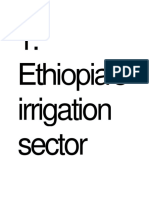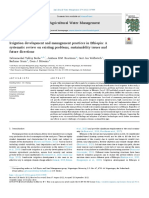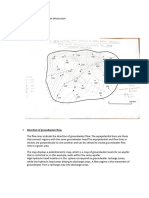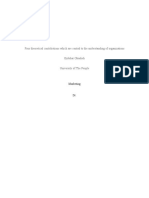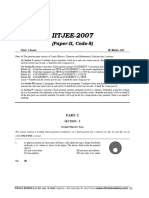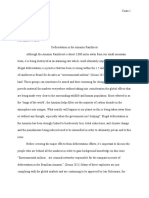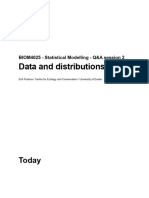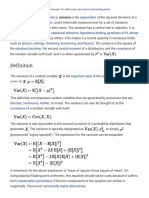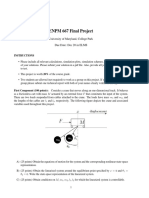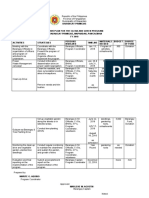Ethiopia is indeed endowed with significant surface and groundwater potential, yet the country has not
fully benefited from these resources as expected.There are several possible reasons why Ethiopia may
not be fully benefiting from its surface and ground water potential. Some of these reasons include lack
of infrastructure, inefficient water management, and climate change. In this essay, we will explore these
reasons in detail and propose potential solutions to address them.
One possible reason why Ethiopia may not be fully benefitting from its water resources is the lack of
adequate infrastructure. The country's water infrastructure, including dams, reservoirs, and irrigation
systems, may be insufficient to harness and distribute water effectively. Insufficient investment in water-
related projects and technologies has also hindered Ethiopia's ability to maximize the potential of its
water resources. The lack of funding for modern irrigation systems, water treatment plants, and water
management initiatives has restricted the country's ability to store and manage water for agricultural,
industrial, and domestic use. As a result, water may not be reaching those who need it most, leading to
water scarcity in some areas and water wastage in others.
Another reason for the underutilization of Ethiopia's water resources may be inefficient water
management practices. Poor governance, lack of proper regulations, and ineffective allocation of water
resources can lead to misuse and overuse of water. Inefficient irrigation techniques, such as flood
irrigation instead of drip irrigation, can also contribute to water wastage. Additionally, inadequate
monitoring and enforcement of water usage can result in unsustainable extraction of groundwater,
leading to depletion of aquifers and long-term water scarcity.
Climate Change Impacts: The effects of climate change, including irregular rainfall patterns, increased
temperatures, and extreme weather events, have exacerbated water-related challenges in Ethiopia.
Changing precipitation patterns, increased frequency of droughts, and rising temperatures can affect the
availability and quality of surface and groundwater. These changes can impact water supply for
agriculture, drinking water, and energy generation. In addition, extreme weather events such as floods
and landslides can damage water infrastructure, further exacerbating the challenges of water
management in the country.
Limited Investment: Insufficient investment in water-related projects and technologies has hindered
Ethiopia's ability to maximize the potential of its water resources. The lack of funding for modern
irrigation systems, water treatment plants, and water management initiatives has restricted the
country's capacity to utilize its water effectively.
Agricultural Practices: Ethiopia's predominantly rain-fed agriculture sector has relied heavily on natural
precipitation, leading to vulnerability to droughts and water scarcity. The limited adoption of sustainable
�agricultural practices, such as drip irrigation and efficient water-saving techniques, has impeded the
sector's ability to optimize water.
Institutional Capacity: Weak institutional capacity and governance structures have hampered Ethiopia's
ability to manage and regulate its water resources effectively. Inadequate coordination among
government agencies, limited technical expertise, and regulatory gaps have contributed to the
underutilization of water in the country.
Potential Solutions to Enhance Water Resource Utilization in Ethiopia:
Infrastructure Development: To address these challenges and fully benefit from its water resources,
Ethiopia can consider several potential solutions. One solution is to invest in improving water
infrastructure, including building new dams and reservoirs, expanding irrigation systems, and
rehabilitating existing water facilities. This would help incease the country's water storage capacity and
improve the distribution of water to areas in need.In addition to this Investing in the construction of
modern irrigation systems, water storage facilities, and hydropower projects can enhance Ethiopia's
capacity to harness its water resources. Developing robust infrastructure will improve water access,
distribution, and utilization across various sectors.
Investment in Technology: Encouraging private and public investment in advanced water technologies,
such as drip irrigation, desalination, and water-efficient appliances, can enhance water productivity and
reduce wastage. Embracing innovative solutions for water treatment and purification will also
contribute to sustainable resource management.
Integrated Water Management: Implementing integrated water resource management approaches that
consider the interconnectedness of surface and groundwater sources can optimize the use of water in
Ethiopia. Coordinating efforts among stakeholders, including government agencies, local communities,
and private enterprises, is essential for effective water governance.
Climate-Resilient Practices: Promoting climate-resilient agricultural practices, such as agroforestry, soil
conservation, and crop diversification, can mitigate the impacts of climate change on water availability.
Encouraging sustainable land use practices and watershed management initiatives will contribute to
long-term water security.
Policy Reforms: Strengthening regulatory frameworks, enacting comprehensive water laws, and
establishing clear guidelines for water allocation and usage are critical for improving water governance
�in Ethiopia. Aligning policies with sustainable development goals and integrating water considerations
into national planning processes will enhance resource management.
To implement more efficient water management practices. This could involve developing and enforcing
regulations for sustainable water usage, promoting water-saving agricultural techniques, and investing
in modern irrigation technologies. By improving the efficiency of water usage, Ethiopia can reduce
wastage and ensure that water reaches those who need it most.
Capacity Building: Enhancing institutional capacity through training programs, knowledge sharing
initiatives, and technical assistance can improve the skills and expertise needed to manage water
resources effectively. Empowering local communities and fostering participatory decision-making
processes will promote inclusive and sustainable water management pra
prove the skills and expertise needed to manage water resources effectively. Empowering local
communities and fostering participatory decision-making processes will promote inclusive and
sustainable water management practices.
Furthermore, international cooperation and support can play a crucial role in helping Ethiopia address
its water challenges. Collaboration with other countries and international organizations can provide
technical expertise, financial resources, and knowledge sharing to support Ethiopia's efforts to improve
its water management practices and adapt to climate change.
In conclusion, while Ethiopia is endowed with abundant surface and groundwater potential, it faces
several challenges in fully benefiting from these resources. Inadequate infrastructure, inefficient water
management practices, and the impacts of climate change are some of the key reasons why Ethiopia
may not be fully utilizing its water resources. By investing in infrastructure improvements, promoting
efficient water management practices, adapting to climate change, and seeking international
cooperation, Ethiopia can work towards realizing the full potential of its valuable water resources.










